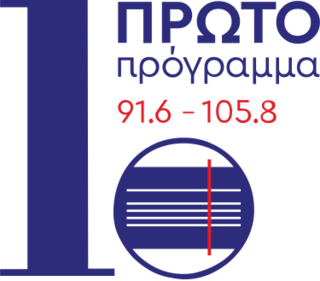Related Research Articles
Public broadcasting involves radio, television, and other electronic media outlets whose primary mission is public service. Public broadcasters receive funding from diverse sources including license fees, individual contributions, public financing, and commercial financing, and claim to avoid both political interference and commercial influence.
Television broadcasting in Greece began in 1966, preceded in 1951 by statute 1963 permitting television broadcasting.

The Hellenic Broadcasting Corporation, commonly shortened to ERT, is the state-owned public radio and television broadcaster of Greece.

The Voice of Greece, also known as ERA 5, is the international service of Greek state radio on shortwave and via satellite and the internet. On 11 June 2013, the Greek government announced the closure of the state broadcaster ERT from 12 June 2013 as an austerity measure.
ERT1, is a Greek free-to-air television channel owned and operated by state-owned public broadcaster Hellenic Broadcasting Corporation. It is the corporation's flagship television channel, and is known for broadcasting mainstream and generalist programming, including news bulletins, talk shows, cultural shows, prime time drama, cinema and entertainment, and major breaking news, sports and special events.
ERT3 is a Greek free-to-air television channel owned and operated by state-owned public broadcaster Hellenic Broadcasting Corporation. It is an entertainment channel, and although it broadcasts nationwide, most of its content is aimed at Northern Greece. It mainly broadcasts from Thessaloniki with regional studios in various north cities, including Florina, Komotini, Alexandroupoli and on the islands of Paros, Lesbos (Mytilene) and Samos.

Greece has participated in the Eurovision Song Contest 44 times since its debut in 1974, missing six contests in that time. Greece's first win came in 2005 with "My Number One", sung by Helena Paparizou. The Greek participant broadcaster in the contest is Elliniki Radiofonia Tileorasi (ERT). Greece has never finished last in the contest.
Nico Mastorakis is a Greek filmmaker and radio producer. He is probably best known for his 1973 live interview of 17 arrested Greek students, which happened without their consent, in favor of the Greek military junta. The students were later tortured. He might also be known for writing and directing the infamous exploitation horror film Island of Death in 1975 and co-creating the nationally available Star Channel in 1993.
Greece participated in the Eurovision Song Contest 2007 with the song "Yassou Maria", written by Alex Papaconstantinou, Marcus Englöf and Markus Sepehrmanesh. The song was performed by Sarbel. To select their entry for the 2007 contest, which took place in Helsinki, Finland, Greek national television broadcaster Hellenic Broadcasting Corporation (ERT) organised the national final Eurovision 2007 which took place on 28 February 2007. The event saw three acts—Sarbel, Tamta and Christos Dantis—compete to be the Greek representative.
The mass media in Greece refers to mass media outlets based in the Hellenic Republic. Television, magazines, and newspapers are all operated by both state-owned and for-profit corporations which depend on advertising, subscription, and other sales-related revenues. The Constitution of Greece guarantees freedom of speech.

New Hellenic Radio, Internet and Television or NERIT (ΝΕΡΙΤ) was the state-owned public broadcaster for Greece from 4 May 2014 to 11 June 2015. Antonis Samaras' coalition government established NERIT to replace the Hellenic Broadcasting Corporation (ERT) in 2013: NERIT began broadcasting under their identity on 4 May 2014, replacing the transitional service Dimosia Tileorasi.

The Broadcasting House or House of Radio is an office and broadcasting installation building in Athens, Greece. It currently houses the Greek state broadcaster, the Hellenic Broadcasting Corporation.
Greece was represented at the Eurovision Song Contest 1998 with the song "Mia krifi evaisthisia" (Μια κρυφή ευαισθησία), composed by Yiannis Valvis, with lyrics by Yiannis Malachias, and performed by Thalassa. The Greek participating broadcaster, Elliniki Radiofonia Tileorasi (ERT), selected its entry through a national final.
Ellinikós Telikós is a song contest which takes place every year in Athens, Greece to decide the artist who would represent Greece in the Eurovision Song Contest. The contest started in 1979, when Elpida took the title. Over the years, the contest took place in various venues, from TV studios to concert halls. The most famous winners include Helena Paparizou, Kalomira, Sakis Rouvas, Anna Vissi, and Katy Garbi.
The National Radio Television Foundation or EIRT was the Greek state broadcaster founded in 1970, during the junta. In 1975 it converted to ERT.

First Programme is the first Greek public radio station, first broadcast by the National Radio Foundation and later Hellenic Broadcasting Corporation.
The Hellenic Radio is the main public radio broadcaster in Greece. Founded in 1987 as a subsidiary of public broadcaster Hellenic Broadcasting Corporation (ERT), it broadcasts four domestic radio channels and the international shortwave radio channel Voice of Greece.
The National Radio Foundation or EIR, was the main public state broadcaster of Greece from 1945 until 1970.
Greece participated in the Eurovision Song Contest 2016 with the song "Utopian Land" written by Vladimiros Sofianidis and performed by the band Argo. The song was internally selected by the Greek broadcaster Hellenic Broadcasting Corporation (ERT) to represent Greece at the 2016 contest in Stockholm, Sweden. Argo were announced as the Greek representatives in February 2016, a month before their song "Utopian Land" was presented.